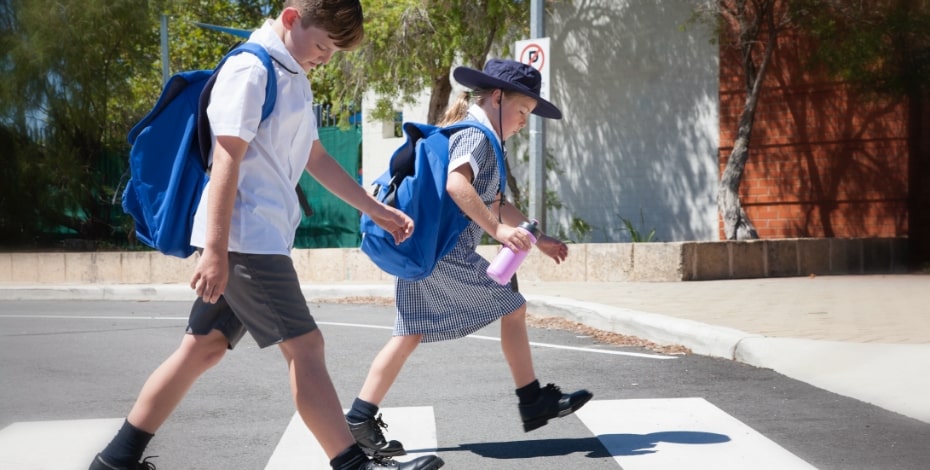
Can children walk and think at the same time?

Psychologist and PhD candidate Emily Subara-Zukic is researching dual-tasking ability in children with and without developmental coordination disorder.
Developmental coordination disorder (DCD) is a common and pervasive neurodevelopmental disorder seen in 5–6 per cent of school-age children.
It is defined by a reduced ability to acquire age-appropriate levels of motor skill (American Psychiatric Association 2013) and is often seen in children but also creates significant ongoing challenges in adulthood if appropriate intervention is not provided (Cairney et al 2005).
Common secondary consequences include reduced physical activity, which can lead to a sedentary lifestyle and mental health comorbidities such as anxiety and depression (Cairney et al 2005).
Although DCD is associated with some underlying issues in motor control and cognitive control, to date there is no well-accepted explanation for how they co-occur (Ruffieux et al 2015, Saxena et al 2017, Schott et al 2016, Gonzalez et al 2016, Kirby et al 2014).
I am a paediatric psychologist with a passion for understanding the development of motor skills and cognition in children, particularly the ability to do both at the same time—also known as dual-tasking.
For example, dual-tasking might mean walking across a busy playground while talking to a friend or riding a bike while reciting a shopping list.
I see firsthand the impact of emerging motor, cognitive and dual-tasking skills on the broader development of children, including self-confidence, social behaviour, achievement and participation in everyday activities.
This is particularly true of those who have some difficulty with motor coordination.
I work alongside a multidisciplinary international team and have recently published a meta-analytical review of DCD research (Subara-Zukic et al 2022).
The findings reveal significant underlying difficulties in the integration of motor and cognitive functioning in people with DCD, flagging this as an important area of future research that will inform diagnostic and intervention frameworks (Subara-Zukic et al 2022).
Aims
I am part of the Development and Disability over the Lifespan program, led by Professor Peter Wilson, Dr Michael Cole and Dr Thomas McGuckian, in the Healthy Brain and Mind Research Centre at Australian Catholic University.
The aim of this project is to explore how children with different levels of motor skill (DCD and non-DCD) develop the ability to perform locomotor-cognitive dual-tasks—something adults usually do with little effort.
The performance tasks are designed to represent the type of activities that children encounter in the real world.
The study will explore how different types of cognitive task (performed while walking) might influence the gait patterns of children and their ability to direct their attention.
Methods
Institutional ethics approval has been granted (2020-237H) and the assessments will involve an online survey and two testing sessions (approximately 30–60 minutes each).
The first session will cover common cognitive and motor assessments, while in the second session, children will perform motor and cognitive dual-tasking through augmented reality.
The augmented reality and tasks chosen are already proving to be exciting for children.
Significance
This research is expected to improve our understanding of the challenges introduced by dual-tasking in everyday life, allowing us to better train for this ability, particularly in children with DCD.
Therefore, it will have implications for physiotherapy practice and will highlight how to scaffold learning and training environments to improve skill acquisition for these children.
How to participate
If you work with, or know, children aged 6–12 years with or without DCD who may be interested in this research, I would be most grateful to hear from their parents. Click here to find out more.
- References
1. American Psychiatric Association. Diagnostic and Statistical Manual of Mental Disorders [Internet]. Fifth Edition. American Psychiatric Association, 2013. https://psychiatryonline.org/doi/book/10.1176/appi.books.9780890425596
2. Cairney, J., Hay, J.A., Faught, B.E., Hawes, R. ‘Developmental coordination disorder and overweight and obesity in children aged 9–14 y.’ Int J Obes [Internet]. 2005 Apr; 29(4):369–72. https://www.nature.com/articles/0802893/
3. Rahimi-Golkhandan. S., Piek, J.P., Steenbergen, .B, Wilson, P.H. ‘Hot executive function in children with Developmental Coordination Disorder: Evidence for heightened sensitivity to immediate reward.’ Cogn Dev. 2014 Oct 1;32:23–37.
4. Fuhs, M.W., Nesbitt, K.T., Farran, D.C., Dong, N. ‘Longitudinal associations between executive functioning and academic skills across content areas.’ Dev Psychol. 2014;50(6):1698–709.
5. Wilson, P.H., Smits-Engelsman, B., Caeyenberghs, K., Steenbergen, B., Sugden, D., Clark, J. et al. ‘Cognitive and neuroimaging findings in developmental coordination disorder: new insights from a systematic review of recent research.’ Dev Med Child Neurol. 2017;59(11):1117–29.
6. Ruffieux, J., Keller, M., Lauber, B., Taube, W. ‘Changes in Standing and Walking Performance Under Dual-Task Conditions Across the Lifespan.’ Sports Med [Internet]. 2015 Dec 1 ;45(12):1739–58. https://doi.org/10.1007/s40279-015-0369-9
7. Saxena. S., Cinar, E., Majnemer, A., Gagnon, I. ‘Does dual tasking ability change with age across childhood and adolescence? A systematic scoping review.’ Int J Dev Neurosci. 2017 May 1; 58:35–49.
8. Schott, N., El-Rajab, I., Klotzbier, T. ‘Cognitive-motor interference during fine and gross motor tasks in children with Developmental Coordination Disorder (DCD).’ Res Dev Disabil. 2016, 57:136–48.
9. Gonzalez, C.C., Mon-Williams, M., Burke, S., Burke, M.R. ‘Cognitive control of saccadic eye movements in children with developmental coordination disorder.’ PloS One. 2016;(11).
10. Kirby, A., Sugden, D., Purcell, C. ‘Diagnosing developmental coordination disorders.’ Arch Dis Child [Internet]. 2014 Mar 1;99(3):292–6. https://adc.bmj.com/content/99/3/292
11. Subara-Zukic, E., Cole, M.H., McGuckian, T.B., Steenbergen, B., Green, D., Smits-Engelsman, B.C. et al. ‘Behavioral and Neuroimaging Research on Developmental Coordination Disorder (DCD): A Combined Systematic Review and Meta-Analysis of Recent Findings.’ Front Psychol [Internet]. 2022 Jan 27;13:809455. https://www.frontiersin.org/articles/10.3389/fpsyg.2022.809455/full
© Copyright 2024 by Australian Physiotherapy Association. All rights reserved.





